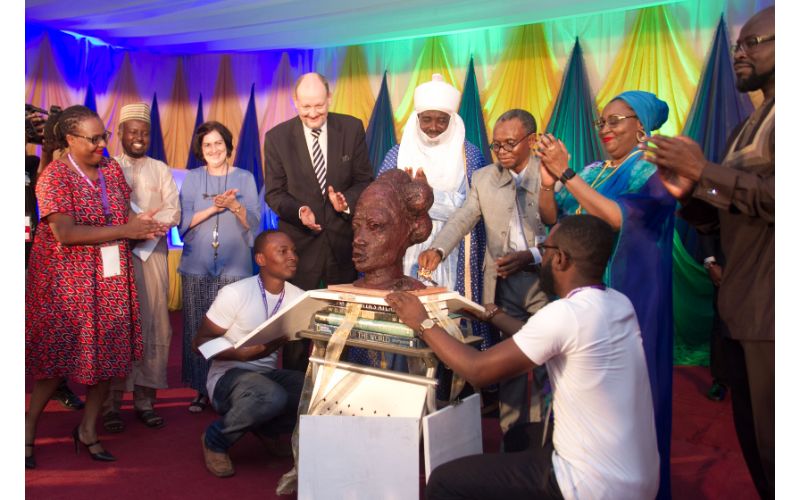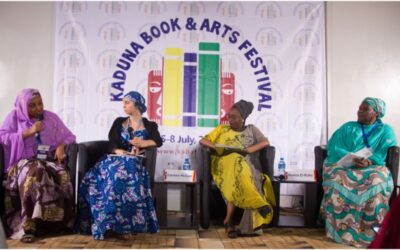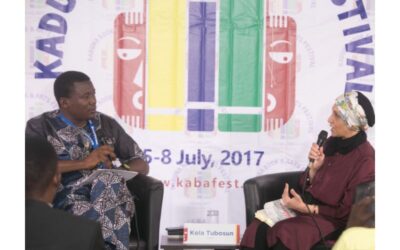Kaduna Book & Art Festival 2017: Opening Ceremony
Kaduna is lighted with creativity! The opening ceremony of the Kaduna book and arts festival at Arewa House featured the welcome address by the Director of Book Buzz Foundation, Lola Shoneyin. She stressed the importance of the festival to the overall development of the capacity of children in northern Nigeria to make informed decisions inspired by their interaction with books and the creative arts in general.
The artistic spark of the day was lighted by an energetic performance by the amazing Titilope Sonuga. The idea behind the creation of Yasmin Foundation was shown through a video presentation. The video showed the space was meant to reinvigorate literacy especially among women and the girl child in Northern Nigeria. The First lady of Kaduna state in her goodwill message applauded the efforts of the organizers and the vision of the initiators of the festival. Maryam Bukar performed her poem, celebrating northern beauty.
The performance of Bazobe cultural troupe added local colour to the proceedings. Their drums, flutes and invocative dance steps appealed to the audience. There were nostalgic gazes from the pan African enthusiasts. Efe Paul maintained the intensity of the displays with the awesome rendition of his poem.
A major highlight of the ceremony was the introduction of The Right to Write Nigerian project that was executed by Moise Gomez, representative of Africultures. In his speech, he emphasized on the therapeutic importance of writing to the soul of a society. He demonstrated his grasp of Nigerian languages by appreciating his listening audience in Hausa. This was followed by a goodwill message by Ambassador H.E Michel Arrion, the head of the European Union delegation. He spoke passionately about the one billion naira literacy project embarked upon by the European Union in the five northern states of Adamawa, Bauchi, Borno, Kaduna and Katsina tagged: Right to Write Nigeria. This project is aimed at enhancing literacy especially in arrears affected by crisis. It will deploy the creative arts and the media to advance culturally important materials which are designed to inspire the youths. The ultimate vision of this project which will be a joint scheme championed by Africultures, a French media organisation, Book Buzz foundation and the federal ministry of Education is to train twenty five writers from northern Nigeria (fifty per cent women) to write culturally sensitive materials that are relevant to students for distribution to two hundred primary and secondary schools in the target states. The books contain stories that will counter the narratives used in radicalisation and will be printed in large number to be able to cover one hundred and forty four students. The project will equip and train one thousand two hundred teachers in the target states.
Marlene Maritz of Gusau institute announced the commencement of a Hausa manuscript competition for Hausa Writers. She also informed the audience of the Writers-in-residence project initiated by the institute to help writers complete their manuscripts in a convenient work space found within the Gusau institute facility.
At exactly 11: 30 am, Mohammed Salim was invited to the stage for a rendition of his poem in Hausa. ‘Mu wakan garin Kaduna muke’ ‘We are singing Kaduna’s song.’ The energy of his voice accompanied by the kalangu drums his responding partners were slapping to the rhythm of his voice created a festive atmosphere. He explored his exploits across northern states in a manner that invites the response of his six partners all clad in flowing kaftans and hand-knitted caps. Following different percussions, Salim improvised to the beat of his drummer and praised the art of writing and writers, leaving the stage for the kalangu profession to delight the audience.
Baji Nyam CFO of marine platforms in his goodwill message was excited by the prospects of this festival to the development of literacy in Kaduna and grateful to be associated with such projects. This led to the formal introduction of Wale Okediran and Danja Abdullah who read in two parts Mallam Labo Yari’s citation. As one of the prolific writers and literary pioneers of the north. Mr. Yari is ranked in the league of Achebe, Aluko, Ekwensi, Soyinka and Amadi among others. Being a true patriot and nationalist, he returned to Nigeria after his studies in Oslo, Norway where he bred a deep interest in not just African Literature but, European Literatures as well; particularly Norwegian. After a stint in journalism during the Nigerian Civil War (1967-1970), he was posted to Stockholm as a press attache in the Nigerian Embassy. Yari is a repository of Hausa culture as many of his published pieces have attested and was able to blend social realism with lives of Northern dwellers in Hausa/Muslim settings. As the first writer from the North to ever publish in English; he posited that ‘Books can only change those who read them,’ and has a panoramic dream of his work affecting not only Nigerians and Africans, but the world as well.
The presentation of the Lifetime Achievement Award to Labor Yari by His Excellency the Governor of Kaduna State, Mallam Nasir Ahmed El-Rufai not only had the paparazzi clicking cameras, shuffling their feet for better positions; it brought curious faces to the stage. Everything was illuminated in the fire of festival: light, camera and action.
Jeremiah Gyang’s performance was phenomenal as well as nostalgic for his old fans. They joined him in singing the ‘African Child’ and were on their feet clapping as he began the hit track ‘Na Ba Ka,’ which he said to have written in 2009. Gyang proved he owned the strings while performing and was able to win another standing ovation first from dignitaries and the entire hall.
The Festival was officially opened by the Governor, Mallam Nasir El-Rufai by unveiling of the Nok terra-cotta sculpture. A stand alone civilization in its own right. The Governor thanked participants and hoped that the dream of holding same festival among other arts and creativity exercises annually will be achieved in the future.
Written by Katung Kwasu and Domnic Aboi


